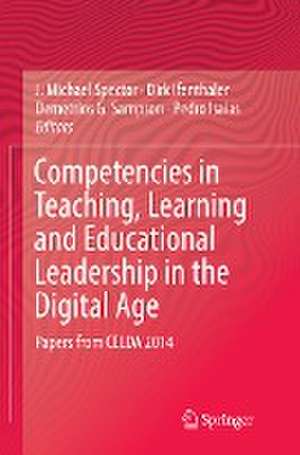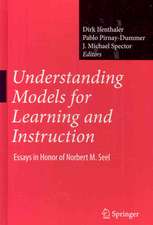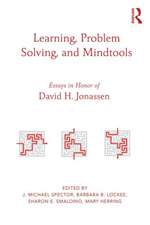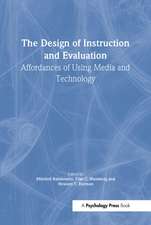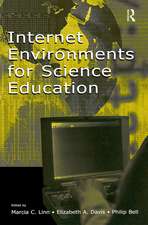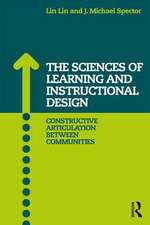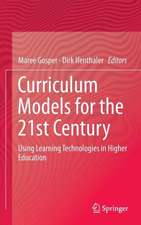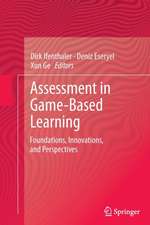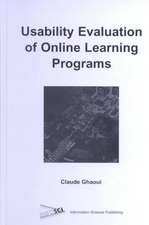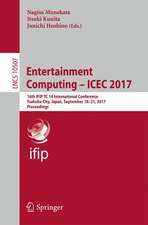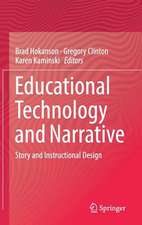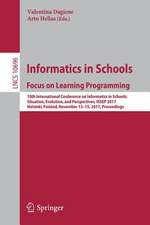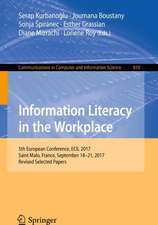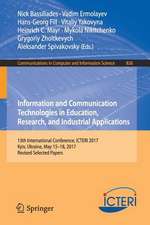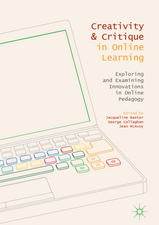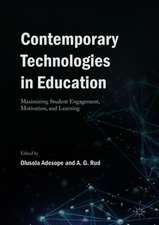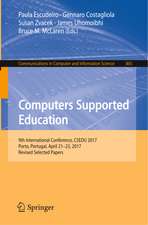Competencies in Teaching, Learning and Educational Leadership in the Digital Age: Papers from CELDA 2014
Editat de J. Michael Spector, Dirk Ifenthaler, Demetrios G. Sampson, Pedro Isaiasen Limba Engleză Paperback – 7 iun 2018
This book makes a contribution to a global conversation about the competencies, challenges, and changes being introduced as a result of digital technologies. This volume consists of four parts, with the first being elaborated from each of the featured panelists at CELDA (Cognition and Exploratory Learning in the Digital Age) 2014.
Part One is an introduction to the global conversation about competencies and challenges for 21st-century teachers and learners. Part Two discusses the changes in learning and instructional paradigms. Part Three is a discussion of assessments and analytics for teachers and decision makers. Lastly, Part Four analyzes the changing tools and learning environments teachers and learners must face.
Each of the four parts has six chapters. In addition, the book opens with a paper by the keynote speaker aimed at the broad considerations to take into account with regard to instructional design and learning in the digital age. The volume closes with a reflective piece on the progress towards systemic and sustainable improvements in educational systems in the early part of the 21st century.
| Toate formatele și edițiile | Preț | Express |
|---|---|---|
| Paperback (1) | 644.82 lei 6-8 săpt. | |
| Springer International Publishing – 7 iun 2018 | 644.82 lei 6-8 săpt. | |
| Hardback (1) | 651.19 lei 6-8 săpt. | |
| Springer International Publishing – 9 aug 2016 | 651.19 lei 6-8 săpt. |
Preț: 644.82 lei
Preț vechi: 758.60 lei
-15% Nou
Puncte Express: 967
Preț estimativ în valută:
123.40€ • 128.05$ • 103.14£
123.40€ • 128.05$ • 103.14£
Carte tipărită la comandă
Livrare economică 17-31 martie
Preluare comenzi: 021 569.72.76
Specificații
ISBN-13: 9783319807720
ISBN-10: 3319807722
Ilustrații: XXII, 363 p. 42 illus., 27 illus. in color.
Dimensiuni: 155 x 235 mm
Greutate: 0.54 kg
Ediția:Softcover reprint of the original 1st ed. 2016
Editura: Springer International Publishing
Colecția Springer
Locul publicării:Cham, Switzerland
ISBN-10: 3319807722
Ilustrații: XXII, 363 p. 42 illus., 27 illus. in color.
Dimensiuni: 155 x 235 mm
Greutate: 0.54 kg
Ediția:Softcover reprint of the original 1st ed. 2016
Editura: Springer International Publishing
Colecția Springer
Locul publicării:Cham, Switzerland
Cuprins
Preface.- 1. Reflections on the Future of Instructional Design Research.- Part I. A Global Conversation about Competencies and Challenges for 21st Century.- 2. Competencies Challenges, and Changes: A U.S. Perspective on Preparing 21st Century Teachers and Leaders.- 3. Initiation and Implementation: Changes to Teacher Education in Ireland.- 4. Digital Learnings and Digital Teachers: Challenges, Changes and Competencies.- 5. Pre-service Teachers’ Perceptions of School Development.- Part II. Changing Learning and Instructional Paradigms.- 6. School Analytics: A Framework for Supporting School Complexity Leadership.- 7. Improving Content Area Reading Comprehension with 4-6th Grade Spanish ELLs Using Web-based Structure Strategy Instruction.- 8. Teachers’ Readiness, Understanding and Workload in Implementing School Based Assessment.- 9. Digital Storytelling: Emotions in Higher Education.- Part III. Assessments and Analytics for Teachers and Decision Makers.- 10. Addressing Standardized Testing Through a Novel Assessment Model.- 11. An EVS Clicker-based Assessment for Radical Transparency in Marking Criteria.- 12. Assessing the Level of Collaborative Writing in a Wiki-based Environment: A Case Study in Teacher Education.- 13. Student-centered Analytics for Postsecondary Education.- 14. Computational Thinking: Toward a Unifying Definition.- Part IV. Changing Tools and Learning Environments.- 15. Designing the Flipped Classroom in Higher Education.- 16. Design4Practice: Scenario for Improving Management Education.- 17. Informal Learning for Possible Science Selves.- 18. Project ‘Flappy Crab’: An Edugame for Music Learning.- 19. Educational App Creation for the Cathedral in Freiburg.- 20. An Approach to Designing and Implementing Intelligent Tutors in Immersive Virtual Environments.- 21. A Synthesizing Look Forward in Teaching, Learning and Educational Leadership in the Digital Age.- Index.
Notă biografică
J. Michael Spector is Professor of Learning Technologies in the College of Information at the University of North Texas, and is editor of Educational Technology Research & Development. Dr. Spector served on the International Board of Standards for Training, Performance and Instruction (IBSTPI) as Executive Vice President; he is on the Executive Committee of the IEEE Learning Technology Technical Committee and is Past-President of the Association for Educational and Communications Technology (AECT).
Dirk Ifenthaler is Chair and Professor for Learning, Design and Technology at University of Mannheim, Germany, Adjunct Professor at Deakin University, Australia and Affiliate Research Scholar at the University of Oklahoma, USA. Dirk Ifenthaler’s research focuses on the intersection of cognitive psychology, educational technology, learning science, data analytics, and computer science. His research outcomes include numerous co-authored books, book series, book chapters, journal articles, and international conference papers, as well as successful grant funding in Australia, Germany, and USA – see Dirk’s website for a full list of scholarly outcomes at www.ifenthaler.info. He is the Editor-in-Chief of the Springer journal Technology, Knowledge and Learning (www.springer.com/10758).
Demetrios G. Sampson is a Research Professor of Learning Technologies at the School of Education, Curtin University, Perth, Australia. He is also affiliated with the Information Technologies Institute, Centre of Research and Technology - Hellas Greece, European Union. Previously, he has been a Professor of Digital Systems for Learning and Education at the Department of Digital Systems, University of Piraeus, Greece (2003-2015) and a Senior Researcher at the Informatics and Telematics Institute, Centre of Research and Technology - Hellas Greece (2000-2003). He is the Editor-in-Chief of the Educational Technology and Society Journal, a Senior Member of IEEE and a Golden Core Member of IEEE Computer Society.
Pedro Isaias is an associate professor at the Universidade Aberta (Portuguese Open University) in Lisbon, Portugal, responsible for several courses and director of the master degree program in Management / MBA. Was director of master degree program in Electronic Commerce and Internet since its start in 2003 until July 2014. He is co-founder and president of IADIS – International Association for Development of the Information Society (http://iadisportal.org/ ), a scientific non-profit association. He holds a PhD in Information Management (in the specialty of information and decision systems) from the New University of Lisbon. He is leading editor of Interactive Technologies and Smart Education (ITSE) Journal (http://www.emeraldgrouppublishing.com/products/journals/journals.htm?id=itse ) from Emerald. Pedro Isaias is an Adjunct Professor at School of InformationSystems – Curtin University, Australia.
Textul de pe ultima copertă
This book makes a contribution to a global conversation about the competencies, challenges, and changes being introduced as a result of digital technologies. This volume consists of four parts, with the first being elaborated from each of the featured panelists at CELDA (Cognition and Exploratory Learning in the Digital Age) 2014.
Part One is an introduction to the global conversation about competencies and challenges for 21st-century teachers and learners. Part Two discusses the changes in learning and instructional paradigms. Part Three is a discussion of assessments and analytics for teachers and decision makers. Lastly, Part Four analyzes the changing tools and learning environments teachers and learners must face.
Each of the four parts has six chapters. In addition, the book opens with a paper by the keynote speaker aimed at the broad considerations to take into account with regard to instructional design and learning in the digital age. The volume closes with a reflective piece on the progress towards systemic and sustainable improvements in educational systems in the early part of the 21st century.
Caracteristici
Discusses how digital technologies have affected the classroom from a global perspective Presents the very latest work in the area where Internet, information and communications technology, learning psychology and instructional design intersect Promotes the effective use of new tools and technologies to support student learning Includes supplementary material: sn.pub/extras
